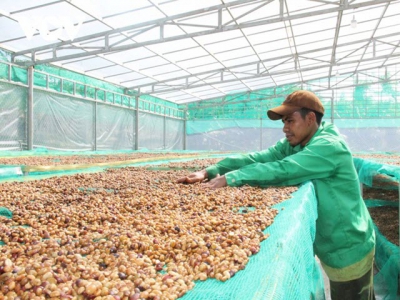Vietnams coffee industry must change to integrate internationally

Vietnam joining new-generation trade agreements has forced its coffee industry to renew itself and become more creative in order to integrate and grow. Coffee growers and producers in the Central Highlands, Vietnam’s coffee capital, are now promoting innovation and creativity in production and trading.
A worker dries coffee beans to produce specialty coffee.
Nguyen The Long of the Vietnam Institute of Policy and Strategy for Agriculture and Rural Development emphasized the need for a long-term strategy, a roadmap, and an integrated system for Vietnam’s coffee industry.
Coffee businesses need to diversify and improve the quality of their products to be able to compete in the world market while growers must comply with standards of sustainable coffee production and use high-tech to expand certified coffee cultivation areas.
That’s the only way Vietnamese coffee can compete in demanding markets, Long said, adding, “We must follow standards of sustainable coffee development such as the Common Code for the Coffee Community 4C and UTZ - the benchmark for the sustainable production of coffee.”
According to Long, “Once we meet those standards, we can meet the WTO’s Sanitary and Phytosanitary (SPS) measures. This will help Vietnam meet the standards set by the EU.”
Coffee growers and coffee producers are now more aware of the situation and have adopted a more appropriate development direction.
At last month’s workshop on coffee innovation, Nguyen Tri Sau, Chairman of the Sau Nhung Agricultural Production and Trade Cooperative in Kon Tum province, said the cooperative is growing 300 hectares of coffee trees in accordance with organic standards using a sprinkler and drip irrigation technology and a solar-powered drying system.
Sau said the cooperative has promoted innovative production methods and raised the awareness of producers.
“Five Central Highlands provinces have been focusing on coffee cultivation so innovation and creativity are becoming more important. Now coffee growers and producers are getting the message that changing their way of processing and marketing their coffee products is the only way to compete worldwide,” he told VOV.
Le Duc Huy, Deputy Director General of Simexco Dak Lak, one of Vietnam’s largest coffee exporters, says innovation is the key to the company’s success against international competition.
“It’s necessary to innovate continuously to improve the quality of Vietnamese coffee and make sure foreign consumers know about it. To that end, we must make farmers understand that they are competing with many kinds of delicious coffee around the world,” said Huy.
Related news
 Tây Ninh Province to continue looking for investment in agriculture
Tây Ninh Province to continue looking for investment in agriculture Tây Ninh Province will continue to focus on encouraging investment in agriculture for the next five years.
 How to improve processing rate of vegetables and fruits for export?
How to improve processing rate of vegetables and fruits for export? Vietnam needs to quickly build qualified raw material areas, develop machinery and technology and issue appropriate mechanisms to attract businesses
 Market still opens for organic agricultural exports
Market still opens for organic agricultural exports Organic agricultural goods are not only consumed in the domestic market, but also exported to many major markets like the US and Japan.